Without Matty Simmons, the world might be a very different place.
A former newspaper reporter, Simmons was the Executive Vice President of Diner’s Club, the first credit card in existence before becoming the CEO of Twenty First Century Communications, which is notable for Weight Watchers Magazine and the best selling humor magazine National Lampoon.
National Lampoon became one of the most important voices in the history of comedy, and Simmons oversaw the magazine’s expansion into into radio, theater, records and film, and introduced the world to such talents as Doug Kenney, Henry Beard, Chris Miller, P. J. O’Rourke, Michael O’Donoghue, Tony Hendra, John Hughes, Gahan Wilson, Rick Meyerowitz, Shary Flenniken, Bobby London, Arnold Roth,John Belushi, Chevy Chase, Gilda Radner, Bill Murray, Brian Doyle Murray, Harold Ramis, Christopher Guest and Richard Belzer.
Simmons’ book, Fat, Drunk & Stupid: The Inside Story Behind the Making of ‘Animal House’ is available now and he was gracious enough to spend some time chatting about comedy, the film and the book.
Before we talk about your book, Fat, Drunk & Stupid, I wanted to mention that I think that the National Lampoon is one of the pillars of modern comedy…
There’s not question about it. National Lampoon set the tone for today’s contemporary comedy.
Do you think it was the talent or the timing or both that responsible for the Lampoon‘s success?
Oh I think it’s the talent.
The magazine or the movie would be popular if they started yesterday. Animal House, for example, is on four times on different cable stations. It plays constantly; people love it, kids of all age love it, college kids still think it’s the Bible.
My youngest daughter goes to college and every kid in that college knows Animal House, not because of her, but because they’ve seen it and love it.
And what it is, is as contemporary as it though it were written yesterday.
You see most movies now that were done 30, 40, 50 years ago and they’re dated. Animal House and National Lampoon were never dated, they were always the kind of humor that we know now. And that’s because it introduced that humor to both print and movies; it’s today’s humor, only it started 30 years… well Lampoon’s started 42 years ago.
Whose idea was it actually, on that note, whose idea was it to set that film in 1962 and do you think by making it a period piece that contributed to its timelessness?
The film was loosely based on the experiences of Chris Miller and his fraternity at Dartmouth, it was a Delta fraternity and it was called Animal House.
Now most of the things that happened in the film did not happen at his fraternity. But his fraternity adventures took place in 1962 and the thing is that we refer to, to many places in the movie were 1962 things. You know, Kennedy and various other things; we put it in that year.
So we set it in a year that we thought that sort of thing happened. What happened was that the movie in 1978 brought back the kind of life that existed more in the Sixties than it did in later years, in particular the late Seventies and Eighties.
Animal House came and brought back toga parties and beer; a lot of beer drinking and a lot of partying. But in that period between the late 60’s early 70’s college life wasn’t as colorful, so we went back to that period that was very colorful.
One thing about National Lampoon was that it seemed to usher in shock with laughs although I find that much of today’s comedy is just shock without the laughs… what are your takes on modern comedy?
You’re exactly right and I had a rule at the Lampoon that you can say anything you want if it’s redeemingly funny.
Much of today’s comedy is people who say anything they want without being funny and this is to me, not comedy. To use obscenities just to get laughs is not creative comedy. To use obscenities because you mean to put them in the story or a line or an adventure that’s funny, that’s fine, you can say anything you want if it’s funny. But you can go to a comedy club now and guys will get up and speak for 15 minutes and it’s just a stream of obscenities and they don’t say anything funny! And that’s because they say ‘fuck’ and ‘shit’ and things like that, that people are going to laugh at, and in many cases people do laugh which is their fault. But for Lampoon it wasn’t that way. We used nudity and obscenity but only when it was funny and only to complement the comedy.
You know one of the things I thought that was interesting in the book was that you really don’t care for bodily function humor. Do you just find it cheap?
No that’s just a personal thing I don’t like scatological humor. I really don’t think it’s funny. I took a scene as you obviously saw, in Animal House when they’re confronted by the Dean and he was going to throw him out of the school and Flounder was drunk the night before and he throws up on the Dean.
As it was written and as Landis wanted to direct it, he wanted him to throw up; he wanted us to see him throw up on the Dean and I said no.
So we cut away from that and you hear him throw up on the Dean and everybody agreed after it was done that it was much funnier that way.
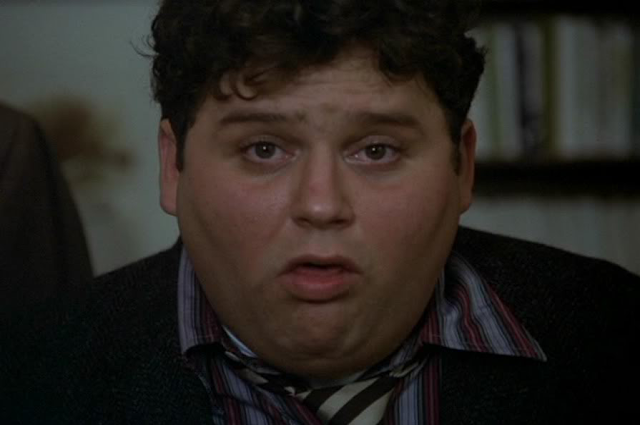 |
| “Out with it, boy…” |
When the film was produced you dealt directly with Sean Daniel, Ned Tanen, and Thom Mount. Now when a movie is made there are dozens of people who are involved at every stage. Do you think this had made film-making easier or has it made it more of a hindrance?
Well the head of the studio Ned Tanen hated the movie, hated the script and hated the whole idea.
Sean Daniel and Thom Mount were junior executives there and they kept pleading with Ned Tanen about the movie. They kept saying this is going to be a great movie and finally Tanen turned to me and said “Can you make this movie for less than 3 million dollars?”
I had never made a movie before and I had no idea how much it was going to cost and I said “Absolutely.”
So he said “Okay you’re the National Lampoon,” and obviously we were very hot at the time – the biggest magazine on college campus and we were the second biggest in the country on newsstands.
And he said “All right make it but keep it under 3 million.” so we made it for 2.8 million.
When you saw the initial cut which was over three hours, what was your first reaction to it? Were there any scenes that were cut that at the time you thought were just great? Great scenes that just didn’t fit well into the film?
Yeah, well you know when you do your first rough cut almost all movies are much longer than they are eventually. So a lot of stuff was cut.
We cut mostly the stuff that we didn’t think was funny, but different things were cut. For example, after they leave the Dexter Lake Club and the girls who went with the black guys, there’s a scene where they’re playing pool with the black guys, and the black guys are bored with the girls.
And they don’t do anything, the girls are intellectual so they start talking about African history and one guy says “I gotta go home, my wife just called me,” and another guy said “I got a meeting,” and it was a funny scene but it was too long.
We cut it down to where you just see the girls walking in the road and saying “Those Delta guys were disgusting,” and one girl says, “Oh I thought Otter was cute,” and the other girls are like “Eww…”
So that was a longer scene that we cut down and there were many other things that we cut entirely.
One of the great scenes that never made the movie was when they were driving to the girls’ school.
They’re driving along and you see a long shot of the car and it comes to a hitchhiker on the road and the car screeches to a halt and the hitchhiker has a guitar strapped to his back and they say “Get in!” and he gets in and they’re in the car and you see the interior and Otter says to him “You play that thing?” and he says “Yeah!” so they he says “Well sing us a song,” and as the car pulls away you can hear over the car it’s Bob Dylan singing that song.
It’s a young Dylan obviously before he was famous and he sings and then the car screeches to a halt, the door flies open and they throw him out of the car. And you know, that’s a lovely, lovely scene but we just felt that whole episode was too long to add that scene.
You dedicate the book to Doug Kenney, John Vernon and John Belushi, what are your favorite memories of each of them on the film?
Well Doug Kenney was of course one of the founding editors of National Lampoon and both Kenney and Belushi were like sons to me; we were very, very close.
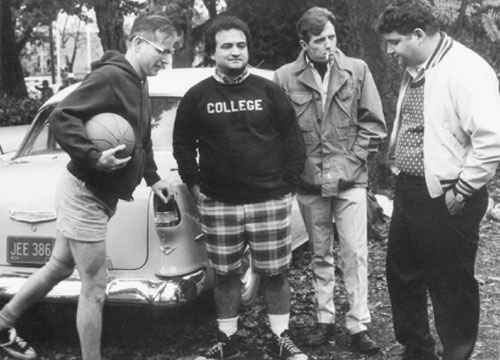 |
| From left: Doug Kenney, John Belushi, screenwriter/co-star Doug Kenney and actor Stephen Furst |
We worked very closely; Kenney of course was an editor at Lampoon, a founding editor and then he didn’t leave until after Animal House, so that was seven or eight years. John Belushi worked for me for four years, he was in my first stage show which was called Lemmings, and then he directed and was one of the stars of the second show, The National Lampoon Show and for a year he directed a radio show which had 600 stations and was very popular.
And of course the people who appeared on all those things included Belushi, Chevy Chase, Chris Guest, Bill Murray, Gilda Radner, Harold Ramis, Meatloaf, you know, we could go on a forever with the the names of unknown people who were introduced for those things, and Doug of course, co-wrote the script with Harold Ramis and Chris Miller and he was a brilliant, brilliant satirist.
He also appeared in the movie, he was Stork who probably was best noted as the guy who grabbed the baton at the end of the movie and leads the band into the alleyway.
And Belushi was Belushi.
Belushi had been with us, as I said, for four years and we wrote the role of Bluto for Belushi.
John Vernon was cast shortly before we started filming. I thought John Vernon was sort of the center of the movie, because you know, he was the guy you hated, and you loved the Deltas partially because of Dean Wormer, and he was sensational!
Many of the famous lines in the movie came from John Vernon; “Fat, drunk and stupid, that’s no way to go through life, son,” and of course that’s the name of the book that we’re talking about.
And the book covers all of that. It covers great stories about Kenney, I think they’re great I’m a little prejudiced, Belushi, and John Vernon
John worked for me in a couple of things after Animal House and we got very close. I spoke at his funeral and you know, that was very sad that he died and I just felt that those three guys made incredible contributions to that movie.
Now you’re back at Lampoon in an advisory capacity as well, am I right?
No.
I came back about 7 or 8 years ago, I got a call from a guy who says “I just took over control of Lampoon and would you like to come back and run the company?”
I said “No, I don’t want to run the company anymore,” and he says “Will you come back as a consultant?”
So I said “Yeah I’ll come back as a consultant, you can put an office in there for me and I’ll come by whenever I’m available and we can talk, because I am doing a couple of movies but when I do those I obviously won’t be available.”
I did do Christmas Vacation 2 while I was there and another movie and so I went by and I was in and out I spent a lot of time talking to these people and they said, “Oh yeah, yeah you’re right, you’re right.”
They didn’t do anything right, I didn’t want them to do these crappy movies that they did. You’re probably aware of some of them.
Yeah, unfortunately.
And I argued with them about doing them. I argued with them about some of the people they brought in to run these movies and different things.
And finally after about two years I went to them and I said, “You know, this isn’t going to work out. I like you, you’re nice guys, but you don’t want to listen and I don’t like what you’re doing to this company.”
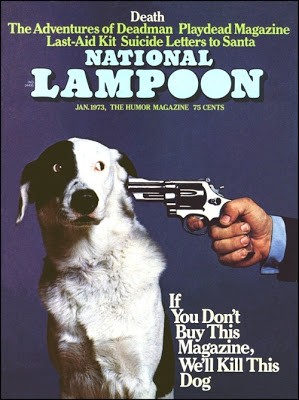 |
| When the Lampoon was king. |
They virtually wrecked the company. The magazine had gone out of business about two or three years after I left. And in all fairness to them, when I left many of the editors and writers left and they replaced them with people who just didn’t know what they were doing. It was just a farce what went on at the Lampoon after I left and then they made a couple of movies that had a little bit of recognition, one was Loaded Weapon with Samuel L. Jackson and Van Wilder. They didn’t make these movies, they licensed them.
When I had movies I made every movie.
I mean the stooges put up the money but I was in charge. They didn’t do that, they just licensed them and you can’t do that, you can’t just let other people destroy you. And of course they didn’t have the ability to produce their own movies; they didn’t know what they were doing. None of the people who came in afterwards were writers or humorists or producers or people who should be writing the Lampoon, you know?
I mean that was what I am, that’s what I do. They weren’t. They were people from different businesses who came in and thought that they could do it and they thought that it would be easy and it wasn’t. They had a lot of problems.
You’re responsible for launching the careers of such humorists such as P.J. O’Rourke, John Hughes, Michael Donahue, Al Jean and Mike Reiss, all of them are obviously funny gentlemen but they had varied different sensibilities. What did you see in them that convinced you that they had it, just that they were funny? Or was there something else?
Well obviously I saw what they wrote!
For example, one day in I guess the late Seventies one of the editors came in and said, “You know this guy from Chicago has been sending us this stuff, look at this stuff!” So I read it and it was sensational!
So I called him up and I said, “I want you to come to New York,”
He said “Well I work, I write copy for an ad agency.”
I said, “I don’t care, take the day off and I’ll send you a ticket to fly to New York.”
So he came in, we talked, and I said, “I want you to quit your job and come work for us as an editor,”
He said, “Oh I would never leave Chicago.”
So I said, “You don’t have to leave, you can stay in Chicago, you come in once a month to editorial meetings and just write!”
That was John Hughes.
A few years later I was going to do a movie called Jaws 3, People 0, it was going to be the third sequel to Jaws.
I had written the story, the treatment and was doing it with Dick Zanuck and David Brown at Universal. I walked into the editorial office and I said to Hughes and a guy named Todd Carroll, “Here’s the story. You guys are in the movie business; you’re writing the screenplay,” and that was Hughes’ first script that he wrote.
If you read the book, Fat, Drunk and Stupid, you know what happens of why that picture was never made, but that was John’s beginning and then of course, he had written a short story for the magazine called Vacation ’58 and I loved it and I said “John I’m making a movie out of this.”
And I did and we made five of them. Five Vacations.
I know there’s a new one being talked about, are you involved with that one?
No, not yet. They called me and said “We want to get the right script and director” but I don’t think I’m going to get involved with it. I’m working on a Broadway musical, a version of Animal House.
That’s awesome. Do you have a favorite joke or do you not do jokes?
Yeah I do jokes, I have a couple. Do you want my all-time favorite joke, it’s not a Lampoon joke but it’s a good one.
Yeah of course!
Old grandmother is walking on the beach on Miami Beach with her little grandson, and the kid is running in and out of the water. Suddenly, a huge wave comes along and washes the kid out to sea.
The old lady on the beach doesn’t know what to do.
She looks up at the sky and she says “God, God please save him! Send him back to me! I’ll do anything! Please!”
Suddenly, another wave comes in and deposits the kid right at her feet. She looks at him and she looks back up to God and she says, “He had a hat…”
(laughs) That is great!
I’ll tell you one more.
This Jewish lady and this Catholic lady are very old and very good friends and every Wednesday they get together to have lunch and talk.
Finally the Jewish lady says to a Catholic lady and says “Look, I love you, you know I respect you being very religious, but tell me, how can you believe that Jesus could touch a glass of water and turn it into wine? And how can you believe that he could walk on water?”
And the Catholic lady and says, “Well maybe there’s a little wine in the glass and he touched it and it turned to wine. And maybe, just maybe there were stones under the water and when he walked he was really walking on the stones. By the way how could you say anything? Moses parted the Red Sea.”
And the Jewish lady looks at her and says, “Wasn’t that something?”
Fat, Drunk & Stupid: The Inside Story Behind the Making of ‘Animal House’ by Matty Simmons is available now from your favorite bookseller/e-tailer.


































































































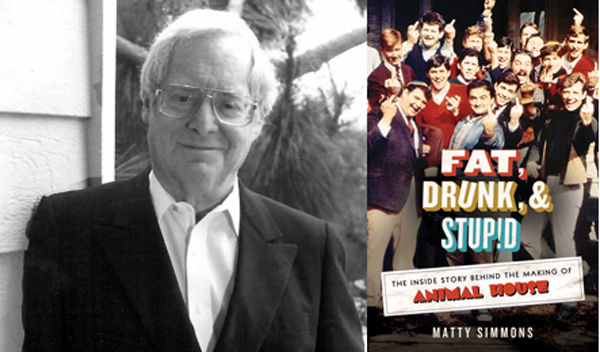
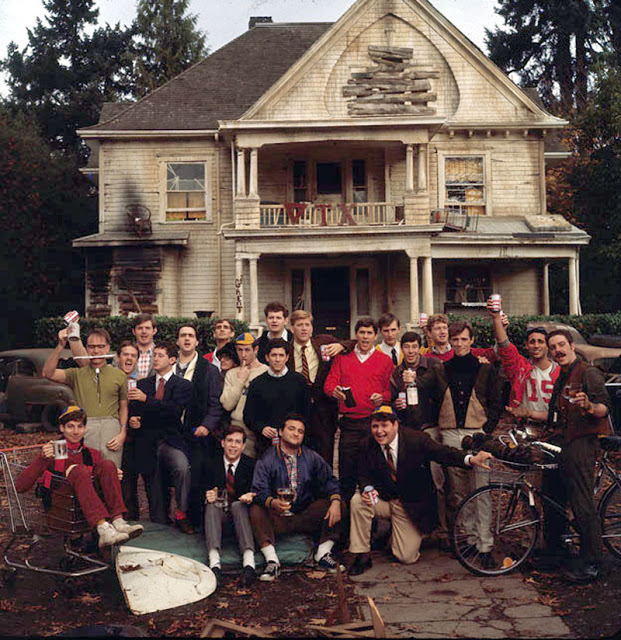
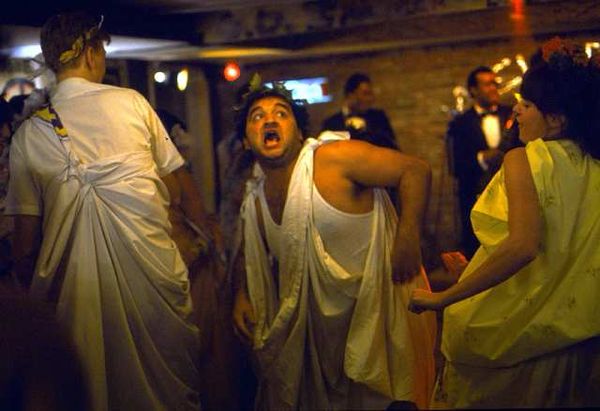
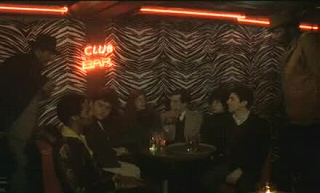
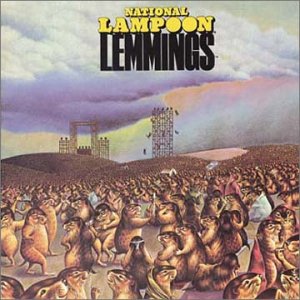

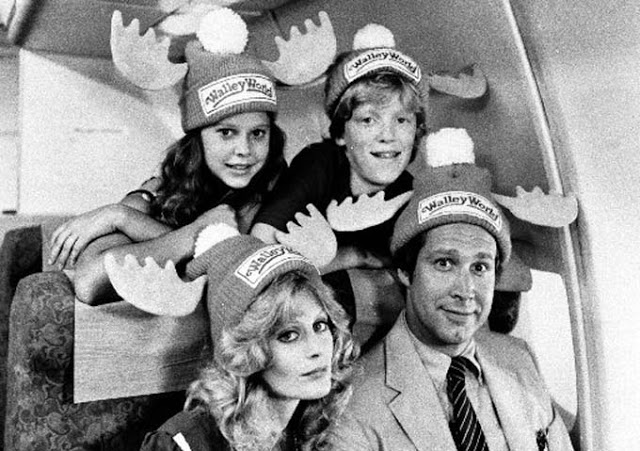







1 Comment